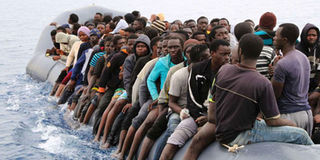EU reviews Libyan naval equipment request

Migrants wait to be rescued from a sinking dinghy off the Libyan coastal town of Zawiyah, east of the capital, on March 20, 2017, as they attempted to cross from the Mediterranean to Europe. The EU wants to combat the smuggling of migrants across the Mediterranean to Europe. PHOTO | ABDULLAH | ELGAMOUDI | AFP
What you need to know:
- The European Union launched its own Operation Sophia in 2015 to crack down on people smugglers based in Libya.
- The Libyan request comprises 130 vessels, including five large, ocean-going patrol boats, along with associated equipment.
VALLETTA
The EU said Thursday it is reviewing a Libyan request for naval equipment to help control migrant flows as doubts grow about the effectiveness of the plan.
The European Union launched its own Operation Sophia in 2015 to crack down on people smugglers based in Libya who ship desperate migrants across the Mediterranean to Europe, often with great loss of life.
But Sophia vessels cannot operate in Libyan territorial waters, so the EU is trying to build up the UN-backed government's coastguard with training and now, possibly supplying equipment.
"We are now assessing together with the Libyan authorities the needs and this is a process that will take place in the next months," EU foreign affairs head Federica Mogherini said as she went into an EU defence ministers meeting in Valletta.
ARRESTING SMUGGLERS
Dutch Defence Minister Jeanine Plasschaert, reflecting reservations shared by several other EU member states, said a "review is ongoing to see whether we are in control (of the situation) and whether we should step up our efforts".
Mogherini stressed that what was important was not that the EU gain access to Libyan territorial waters but that the people smugglers be stopped from operating there.
"What we are currently doing is trying to empower the Libyans to do this work," she said.
EXTENSIVE TRAINING
According to EU diplomatic sources and documents seen by AFP, the Libyan request comprises 130 vessels, including five large, ocean-going patrol boats, along with associated equipment.
A document drawn up by the EU Border Assistance Mission in Libya said such a force would require extensive training and back-up facilities, which appeared not have been fully taken into account.
A separate document drawn up by the EU's border control agency, Frontex, made a similar point, suggesting that current, relatively short EU training programmes for the Libyan coastguard were also not enough to produce the skilled crew and engineers needed.
One EU diplomatic source described the request as a "shopping list" and another said it was "not at all realistic" in the current situation in which the Libyan government is fighting for survival.
Libya's UN-backed Government of National Accord is struggling to assert its authority but faces huge problems from Islamic militias and warlords who have been fighting for control since the West ousted long-time Libyan dictator Muammar Gadhaffi in 2011 .





